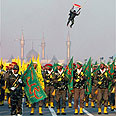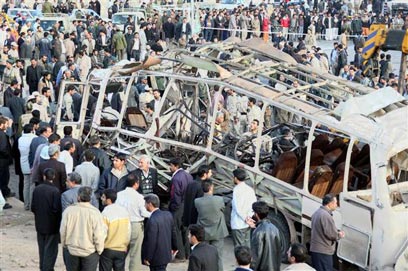
Iran's Revolutionary Guards march (Archives)
Photo: AP
Eleven people were killed Wednesday when a car bomb ripped through a bus carrying members of Iran's elite Revolutionary Guards in a sensitive southeastern border province, official media reported.
The bus was taking the Guards from their housing compound in the city of Zahedan to a military base when gunfire forced it to stop in front of the booby-trapped car, which then exploded.
An attack of this size and nature - a bomb strike on an elite force in broad daylight in an open street - is unprecedented in Iran.
Television pictures broadcast on Iran's Arabic-language station Al Alam showed that the bus had been blown away to a twisted frame of wreckage by the blast and a large crowd had gathered at the scene.
"In the bombing this morning in Zahedan, 11 people were martyred in a thoughtless action," said local Guards commander Mohammad Javad Ethna Ashari, blaming bandits and outlawed groups opposed to the Islamic republic.
It was not immediately clear whether all the dead were from the Revolutionary Guards, Iran's elite ideological army. Ethna Ashara said that 31 people were wounded.
IRNA's correspondent in Zahedan quoted witnesses as saying that militants placed a booby-trapped car in the path of a bus carrying Revolutionary Guards ground forces and detonated the explosives when the bus drew near.
The witnesses said that among the militants were motorcyclists who shot at the bus to force it to stop. The bomb inside the car, a standard Iranian Peykan model, was apparently detonated by remote control, they added.

Scene of the attack (Photo: Reuters)
Afghan bandits in March year last year shot dead 22 people traveling between Zahedan and the neighboring border city of Zabol.
IRNA reported that two of the militants found carrying grenades and camcorders had been apprehended by the public and arrested while three others were detained later.
Zahedan is the capital of Sistan-Baluchestan province that borders both Afghanistan and Pakistan and has been hit by a string of attacks and kidnappings blamed on a Sunni group called Jundallah (Allah's Brigade).
The province has a substantial Baluch community, a minority Sunni Muslim group.
UK, US accused of supporting ethnic minority rebels
Zahedan, a dusty and tense border city, has been the center of low-level unrest in the region over the past months.Earlier this year, four members of the Iranian security forces were killed in the city when armed men opened fire on their vehicle. In December, a car bomb exploded in Zahedan, killing one person.
Hossein Ali Shahriari, a deputy representing Zahedan in parliament, blasted the police and military for failing to take appropriate security measures, the ISNA agency reported.
"Why does our diplomatic apparatus does not seriously confront the Pakistani government for harboring bandits and regime's enemies? Why do security, military, and police officials not take a more serious action?
"I have no choice but to take my plea to the supreme leader (Ayatollah Ali Khamenei) and ask his eminence to ask the officials to make every effort to restore security," he said.
The upsurge in unrest in Sistan-Baluchestan also comes after violence in Iran's oil-rich southwestern province of Khuzestan, which has a minority Arab population.
Bomb attacks in October 2005 killed six people in the provincial capital of Ahvaz and wounded nearly 100. Another double bombing in January 2006 killed eight and wounded 46.
Iranian officials have accused Britain and the United States of supporting ethnic minority rebels operating in the Islamic republic's sensitive border areas.
Iranian intelligence minister Gholam Hossein Mohseni Ejeie said last week that Tehran had identified 100 spies working for the United States and Israel in border areas of the Islamic republic.
Such accusations come amid rising tensions between Iran and the West over the Iranian nuclear program, which the United States alleges is cover for a weapons drive.
Iran, however, insists that its nuclear program is purely aimed at generating energy.
Although Washington has said that it wants the nuclear standoff resolved through diplomacy, it has never ruled out military action to thwart Iran's atomic drive.















